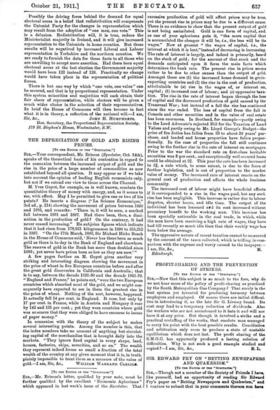THE DEPRECIATION OF GOLD AND RISING PRICES.
[TO THE EDITOR OF THE "SPECTATOR."]
SIR,—Your correspondent, Mr. Briscoe (Spectator, Oct. 14th), speaks of the theoretical basis of his contention in regard to the connexion between the increased output of gold and the rise in the price of a large number of commodities as now established beyond all question. It may appear so if we take into account the opinion of leading English economists only, but not if we extend our view to those across the Channel.
M. Yves Guyot, for example, as is well known, combats the quantitative theory of money with energy, and, as it seems to me, with effect. May I be permitted to give one or two of his points ? He inserts a diagram (" La Science Economique," 3rd ed., p. 214) showing the movement of prices between 1890 and 1905, and remarks : " There is, it will be seen, a marked fall between 1891 and 1897. Had there been, then, a dimi- nution in the production of gold ? On the contrary, it had never ceased increasing." He subjoins figures which indicate that it had risen from 178,821 kilogrammes in 1890 to 355,212 in 1897. "On the 17th March, 1896, Sir Michael Hicks Beach in the House of Commons said, ' Never has there been as much gold as there is to-day in the Bank of England and elsewhere. The reserve of gold in the Bank has more than doubled since 1893 ; yet never have prices been so low as they are now.' " A few pages further on M. Guyot gives another very striking and interesting diagram showing the movement in the price of wheat in five European countries before and after the great gold discoveries in California and Australia ; that is to say, between the decade 1821-30 and the decade 1861-70. "England and France," he points out, "were the two European countries which absorbed most of the gold, and we might con- sequently have expected to see in them the greatest rise in the price of wheat. Nothing of the sort, however, happened. It actually fell 14 per cent. in England. It rose, but only by 17 per cent. in France, while in Austria and Hungary it rose by 142 and 131 per cent.; yet they were countries where gold was so scarce that they were obliged to have recourse to issues of paper money."
In connexion with the theory of the subject be makes several interesting points. Among the number is this, that the index numbers take no account of anything but circulat- ing capital of the merchandise that is brought daily into the markets. " They ignore fixed capital in every shape, land, houses, factories, ships, securities, and so on." The wealth they represent indeed forms so small a fraction of the total wealth of the country at any given moment that it is, in truth, plainly impossible to treat them as a measure of the value of
gold.—I am, Sir, &c., WILLIAM WARRAND CARLILI.














































 Previous page
Previous page